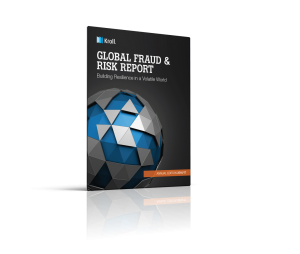 The 2016 Annual Global Fraud and Risk Report by Kroll puts the UK in the unenviable position of being the second highest ranking country in the world (only Columbia scored higher) when it comes to businesses falling victim to fraudsters. We ask is the problem getting worse and should firms be worried?
The 2016 Annual Global Fraud and Risk Report by Kroll puts the UK in the unenviable position of being the second highest ranking country in the world (only Columbia scored higher) when it comes to businesses falling victim to fraudsters. We ask is the problem getting worse and should firms be worried?
In a separate report – BDO put the total value of reported frauds (cases with a value of £50,000 or more) at £2bn in 2016 up from £1.5bn in 2015, although the number of reported incidents fell slightly, down to 504 in 2016 from 519 in 2015. This is a statistically small sample of cases and is based purely on reported fraud which can skew the figures due to one or two particularly high value cases.
In other figures by the Office for National Statistics fraud now accounts for more than one in three of all reported crimes and is the country’s most common offence.
Importantly the BDO figures and the ONS statistics cover all fraud (business and individual) whereas the Kroll figures are solely business related frauds.
A separate report by PKF Littlejohn estimated that the total cost of fraud to the UK economy was £193 billion. This calculation is a more robust attempt to measure fraud losses through a fraud and loss measurement exercise. This measure therefore avoids the pitfalls of other simple counts of incidents of fraud which are never going to give the complete picture because such a reactive measurement is inherently flawed.
Perhaps therefore the ONS statistics and the BDO report understate the problem because they are based on reported crimes and it is still the case that many frauds go unreported as firms look to more informal remedies rather than exposing their ‘dirty laundry’ in public.
Interestingly the Kroll report is based on surveys and interviews with senior leaders and therefore includes perceptions around fraud as well as hard facts. However firms who are more aware of the risks and who are proactively managing the risk through an holistic fraud management strategy are also more likely to identify fraudulent activity. One factor highlighted is that UK firms are more aware of fraud risk and their vulnerability due to regulatory and legal requirements.
So what about those management perceptions of fraud being a major problem – are they based on reality. Well certainly the number of press reports keeps fraud in the forefront of peoples’ minds. Just this evening’s commute the paper had no less than three fraud headlines in the first few pages including a district judge and solicitor who swindled clients and an accountant who swindled celebrities for whom he managed cash!
Of course the picture isn’t consistent across all sectors. The BDO figures show that Financial Services and Insurance have shown a reduction in incidents reported, perhaps due to the increased regulatory and public scrutiny in those areas.
There are geographical differences too in the UK with the West Midlands and London being particular hotspots according to BDO.
It is important to consider not just the volume but value of frauds reported but again this can be impacted by factors such as early detection. With better cross-industry data sharing in financial services and insurance could that be having a positive impact on both the volume and value i.e. detected fraud incidents could increase while fraud losses decrease if those data sharing methods lead to more frequent and earlier detection.
According to the BDO report the biggest percentage increases relate to Arts, Entertainment and Recreation as well as Wholesale Trade.
Employee fraud shows an increase from 2015 and remains one of the top five types of fraud according to BDO. These figures are backed up by Kroll who conclude that irrespective of Geography, Industry or type of fraud, companies are most at risk from employees (past and present) as well as temporary workers and contractors.
So to return to our original questions: because of the difficulties outlined above it is not easy to say whether the problem is getting worse or not, however it is clear from all the data that fraud is still something that all firms (irrespective of size) need to be concerned about.
To combat the threat firms need to make sure that they are proactively managing the risk rather than simply reacting to an issue. We explain more about this approach here.
Firm’s need to assess/reassess the risks and understand the scale and nature of the threat across different parts of their business. You can find further fraud risk assessment guidance and tools here.
Boards will want assurance as to the adequacy of existing fraud management arrangements and our Organisational Capability Self Assessment Tool can provide a useful benchmark against fraud management standards.


No comments yet.